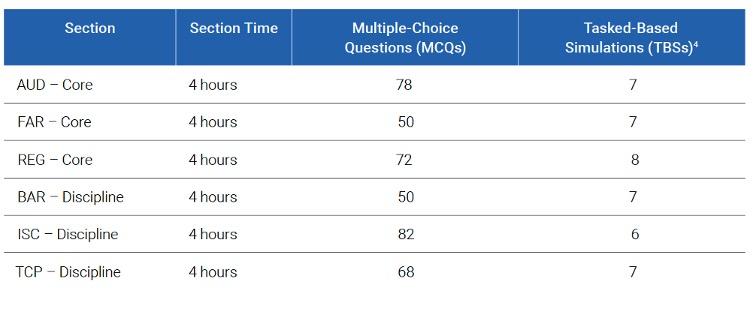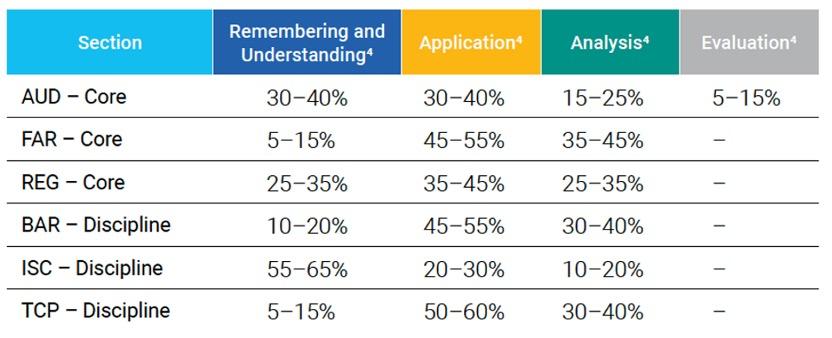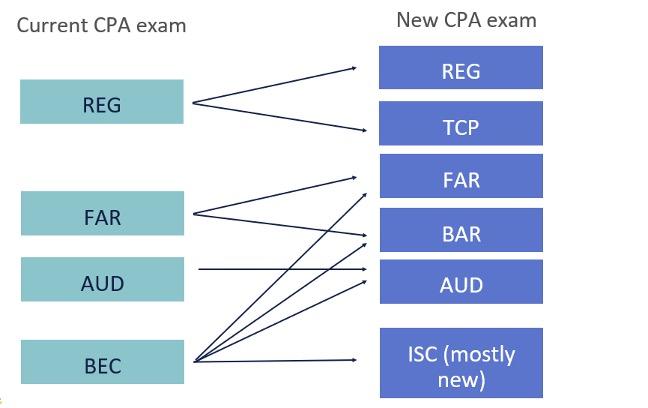
The American Institute of Certified Public Accountants (AICPA) publishes a CPA Exam blueprint which outlines the format and content that candidates can expect to encounter on the exam. In 2024, AICPA and the National Association of State Boards of Accountancy (NASBA) launched CPA Evolution – a new CPA Exam format designed to reduce skill gaps, create flexibility, and provide greater opportunities for accountants to develop specialized knowledge in particular areas. We're sharing the 2025 CPA Exam blueprint, which will include changes from CPA Evolution as well as the upcoming updates you should know about.
A summary of the CPA Exam blueprint
Prior to CPA Evolution, all candidates had to pass the same four sections of the CPA Exam. Starting in 2024, all candidates must pass three Core sections that focus on knowledge and skills that are universal to all CPAs. They must also pass one of three Discipline sections that focus on a specialized knowledge.
Candidates who passed Business Environments and Concepts (BEC) prior to 2024 will not need to pass a Discipline. The 2024 CPA Exam blueprint also includes changes to the CPA Exam content, section time, question count, and skill level as well as how the CPA Exam sections are scored.
The 2025 CPA Exam blueprint does not bring significant changes nor do any revisions significantly change the nature or scope of the content that is eligible for testing.
Jump ahead
- Why change the CPA Exam blueprint?
- Changes to the 2025 CPA Exam
- CPA Exam section content
- CPA Exam section structure and scoring
- CPA Exam skill levels
- Key takeaways from the CPA Exam Blueprint
Why change the CPA Exam blueprint?
Planning the sweeping changes to the CPA Exam blueprint started following an AICPA report1 published in 2019. The report showed that accounting firms were hiring fewer accountants and investing more in employees with stronger competency in technology and data analytics. A gap analysis showed that recent accounting graduates were skilled in data analytics and IT audits, but were less skilled in cybersecurity, IT governance, or Systems and Organization Control (SOC) engagement. To address these gaps and ensure that the accounting degree is still relevant, the AICPA and NASBA worked together to transform the "old" CPA Exam.
Each year, the AICPA updates the exam (and the blueprint) to factor in changes in regulation and law as well as continually reflect the needs of the profession.
Changes to the CPA Exam structure
Prior to 2024, the CPA Exam consisted of four sections that all candidates had to pass:
- Auditing and Attestation (AUD)
- Business Environment and Concepts (BEC)
- Financial Accounting and Reporting (FAR)
- Regulation (REG)
The current format includes these three Core exams:
- Auditing and Attestation (AUD)
- Financial Auditing and Reporting (FAR)
- Taxation and Regulation (REG)
Candidates must also pass one of three Discipline sections. Each one is centered on more specialized knowledge and skills gained in the Core sections:
- Business Analysis and Reporting (BAR)
- Information Systems and Controls (ISC)
- Tax Compliance and Planning (TCP)
CPA Exam section content
Core section - Auditing and Attestation (AUD)
The AUD Core section tests knowledge and skills you will need to show when performing audit engagements, attestation engagements, and accounting and review service engagements.
Content areas
- Area I: Ethics, Professional Responsibilities, and General Principles is allocated 15 to 25%
- Area II: Assessing Risk and Developing a Planned Response — 25 to 35%
- Area III: Performing Further Procedures and Obtaining Evidence — 30 to 40%
- Area IV: Forming Conclusions and Reporting — 10 to 20%
2025 blueprint changes
- Added examples to representative tasks in Area I, II, and III.
- Added referred-to auditor to three representative tasks in one Group in Area II
- Made a technical correction to a representative in one Group in Area III
Core section - Financial Accounting and Reporting (FAR)
The FAR Core section tests the knowledge and skills needed with respect to financial accounting and reporting frameworks, including those issued by the Financial Accounting Standards Board (FASB), U.S. Securities and Exchange Commission (U.S. SEC) and the AICPA for use by both for-profit and non-profit entities.
Content areas
- Area I: Financial Reporting is allocated 30 to 40%
- Area II: Select Balance Sheet Accounts — 30 to 40%
- Area III: Select Transactions — 25 to 35%
2025 blueprint changes
- Removed the reference to the direct method in a representative task in Area I for nongovernmental, not-for-profit entities
- Revised one representative task in one Group in Area I to clarify which methods are applicable when preparing income tax basis financial statements
Core section - Taxation and Regulation (REG)
The REG Core section tests the knowledge and skills concerning U.S. ethics and professional responsibilities related to tax practice, U.S. business law, and U.S. federal tax compliance for individuals and entities with a focus on recurring and routine transactions.
Content areas
- Area I: Ethics, Professional Responsibilities and Federal Tax Procedures is allocated 10 to 20%
- Area II: Business Law — 15 to 25%
- Area III: Federal Taxation of Property Transactions — 5 to 15%
- Area IV: Federal Taxation of Individuals — 22 to 32%
- Area V: Federal Taxation of Entities (including tax preparation) — 23 to 33%
2025 blueprint changes
- A technical correction to a representative task in one Group in Area IV
Discipline section - Business Analytics and Reporting (BAR)
The BAR Discipline section tests more complex technical accounting topics than those covered by FAR. More specifically, this section assesses knowledge and skills related to:
- Analyzing financial statements and financial information
- Select technical accounting and reporting requirements under the FASB and SEC
- Financial accounting and reporting requirements under GASB that are applicable to state and local government entities
- Data and technology concepts, such as verifying the accuracy of sources used to analyzed financial statements and information and determining methods to transform data into a valuable tool used in decision-making.
- Applied research, focusing on reviewing and using source materials to complete tasks, including identifying problems, analyzing facts, and determining appropriate responses
Content areas
- Area I: Business Analysis is allocated 40 to 50%
- Area II: Technical Accounting and Reporting — 35 to 45%
- Area III: State and Local Governments — 10 to 20%
2025 blueprint changes
- Revised a representative task in one Group in Area II based on recent standard-setting activity
- Added examples to a representative task in one Topic in Area III
Discipline section - Information Systems and Controls (ISC)
The ISC Discipline section tests the knowledge and skills concerning information systems, including processing integrity, availability, security, confidentiality, and processing. It also covers topics a CPA must be competent in related to data management, including data collection, storage, and usage throughout the data life cycle. It also assesses the knowledge and skills related to information technology (IT) audit and advisory services, including SOC engagements.
Content areas
- Area I: Information Systems and Data Management is allocated 35 to 45%
- Area II: Security, Confidentiality, and Privacy — 35 to 45%
- Area III: Considerations for System and Organization Controls — 15 to 25%
2025 blueprint changes
- Updated the References of the Section Introduction to reflect a new version of a document issued by the Center for Internet Security and to remove the Cybersecurity & Infrastructure Security Agency (CISA) reference to Security Tips published by the National Cyber Awareness System (NCAS) based on recent updates to the CISA website
- Made technical corrections to the Skill allocation of the Section Introduction and representative tasks to Topics in Area I and II and to a Group in Area II
- Added one analysis representative task to one Topic in Area I
- Clarified the terminology used in a representative task in one Group in Area I
- Updated the References of the Section Introduction and one representative task in one Group in Area II
- Updated the Section Introduction, updated a representative task, and removed a representative task in one Group in Area III to clarify the scope related to SOC for Cybersecurity reports
Discipline section - Tax Compliance and Planning (TCP)
The TCP Discipline section will assess skills and knowledge related to U.S. federal tax compliance for individuals and entities, U.S. federal tax planning for individuals and entities, and personal financial planning.
- Federal tax compliance emphasizes nonroutine and complex transactions and focuses on your role in preparing and reviewing tax returns.
- Federal tax planning focuses on your role in analyzing the tax implications of proposed transactions, available tax options, or business structures.
- Personal finance planning focuses on the strategies and opportunities typically identified by CPAs in connection with individual tax return preparation and review.
Content areas
- Area I: Tax Compliance and Planning for Individuals and Personal Financial Planning is allocated 30 to 40%
- Area II: Entity Tax Compliance — 30 to 40%
- Area III: Entity Tax Planning — 10 to 20%
- Area IV: Property Transactions (disposition of assets) — 10 to 20%
2025 blueprint changes
- Made technical corrections to representative tasks in one Group in Area I and one Group in Area III
- Removed the reference to carrybacks related to net operating losses in a Topic in Area II
CPA Exam section time and question count
All candidates have four hours to complete each section of the exam, including Core sections and Disciplines, unless you have requested and were granted CPA Exam accommodations. Within the individual sections, there are two testlets consisting of multiple-choice questions (MCQs) and three testlets consisting of task-based simulations (TBSs).
It's important to note that with the removal of BEC, there are no longer any written communication tasks.
Skill levels in the CPA Exam blueprint
Like the original CPA Exam, the new CPA Exam blueprint has the same skill level categories: remembering and understanding, application, analysis, and evaluation.
The table below outlines the skill level categories within each CPA Exam section:
How the CPA Exam blueprint changed with Evolution
When CPA Evolution launched, very little content was removed from the exam. Instead, many of the changes were
Here are the biggest takeaways:
- Most of the content that was previously assessed in the BEC section has been moved to the AUD, FAR, BAR and ISC sections, except the written communication item which will be completely removed.
- The content from the current FAR section will be split between the new FAR and BAR sections.
- Content from the current REG section will be split between the new REG and TCP sections.
- Some content in the current FAR and REG sections will now be tested in the BAR and TCP Discipline sections, respectively.
Below is a diagram to help summarize these changes.
A few important transition items to note:
- If you passed AUD, FAR, and REG prior to January 2024, you will not need to pass the updated versions.
- If you passed BEC before January 2024, you will not need to take a Discipline section of the exam.
- If you fail a Discipline section of the exam, you can switch to a different Discipline if you find that there is a better option for you.
Becker gets you Exam Day ReadySM
Becker works closely with the AICPA to ensure our CPA Exam Review reflects the newest exam blueprint. We continually update our review course and materials to align with the exam and provide the best possible experience to our students.
Download our FREE CPA Exam ebook
If you want to learn more about the CPA Exam, download our free CPA Exam guide for 2024 and get a clear look at what you can expect. What's inside?
- An overview of the CPA Exam
- Comprehensive details of each section, including the exam format, section times, scoring details, and key content areas
- Choosing your Discipline
- Do's and don'ts to get ready for the CPA Exam
- Exam study tips
- Multiple-choice practice questions













